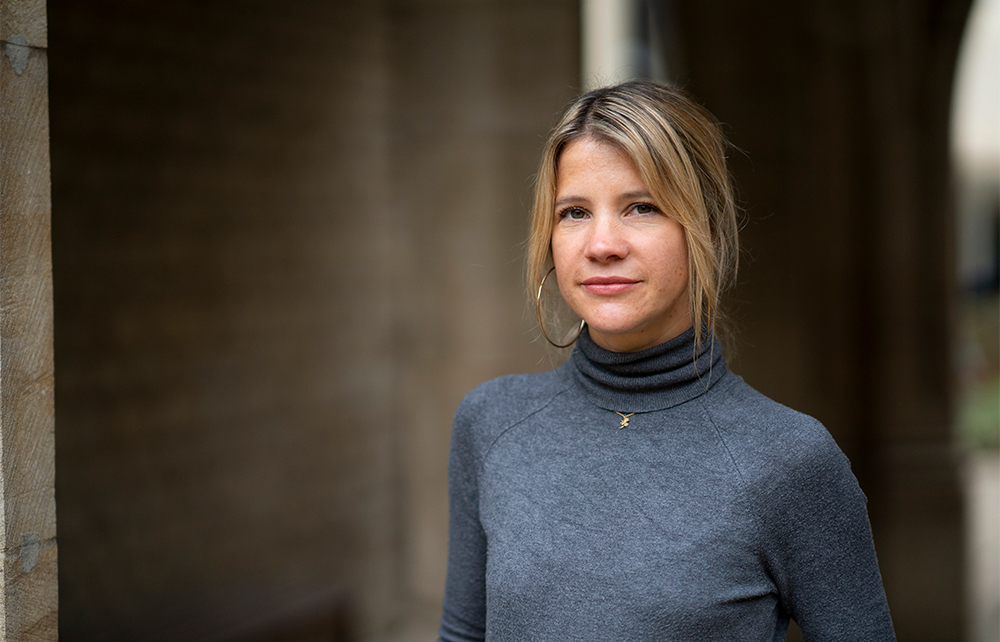Publishing has never much distinguished between fame and notoriety, and it’s hardly Charlotte Philby’s fault that her grand-father was the double agent Kim. Still, it seems an odd credential to extol. Philby is a good enough writer to be lauded for her work alone, and her latest book, The End of Summer (Borough Press, £16.99), is spy-free and her best so far.
It’s 1985 and Judy McVee is an attractive teenage hustler who leaves her unsympathetic mother in London and moves to New York. There she supports herself by pilfering wallets from men in bars who mistake her friendliness for availability. But Judy is looking for bigger fish than the suckers in local saloons, and she soon picks out a very different target when she sees a photo in the New York Times of a recently widowed millionaire named Rory Harrington, who summers in Wellfleet, Massachusetts. Driving south to Cape Cod, she covers her tracks by stealing not just one but two cars, before buying a third.
Arriving in Wellfleet, Judy gatecrashes a party she knows Harrington will attend. She meets him, and her beauty and tart humour immediately captivate him. Soon he proves putty in her hands. The only problem for Judy is that she finds herself falling in love with her prospective victim.
The couple marry and settle in London. Early in their relationship, Judy has told Harrington that her mother is dead; but the woman is very much alive, though living in squalor and slowly succumbing to dementia. Judy feels enough daughterly obligation to pay for her mother’s care, and needs money of her own to do so. That, at least, is her rationale for her continuing compulsion to steal.
The strains of the double life Judy leads – one day staying with rich friends in the country, the next visiting a fence in King’s Cross to sell off what she’s stolen – are especially well captured. As we follow her through her years in London and the birth of a daughter, Francesca, we begin to see that the key to her thieving lies in an edict from her hapless mother that she will never ‘rely on any man’. Instead, she opts to rob them blind.
Judy is usually careful when stealing, but certain opportunities are so tempting that her impulsiveness overcomes her caution. The risks she takes suggest a psychopathology that would be baffling were it not for the subtle delineation of its origins. The portrait of Judy is enhanced by the commentary of Francesca, the one objective witness as the past finally catches up with her mother. But it is Judy who stands out as a great fictional creation and makes the book so memorable.
Before the usual autumn avalanche of crime fiction arrives, it’s worth noting some thrillers that have recently gone unappreciated. Here are three especially good ones.
Charlotte Vassell’s debut, The Other Half, published last year, was a self-conscious attempt to portray the doings of this generation of Bright Young People. Though well written, it did not have the economy of Evelyn Waugh’s Vile Bodies or the brilliance of his descriptive prose, but it introduced a wonderful character in its detective protagonist Caius Beauchamp. He is an interesting figure – mixed race (half-Jamaican, half-Irish), conscious of class distinctions but somehow classless himself.

In Vassell’s new, better-plotted novel, The In Crowd (Faber, £16.99), he comes into his own, investigating two murders which naturally, by the unwritten laws of crime fiction, prove linked. One of them also provides a love interest for him – a hatmaker named Callie, who, like himself, is not in any sense pukka, but who works with an immensely wealthy clientele. Their romance is admirably unsoppy, and one which all but the most cynical will find themselves rooting for.
There are two other members in Beauchamp’s team: the Anglo-Asian Matt Cheung, and Amy Noakes, who is gay, and the interactions between the three are often very funny. The novel is a leap forward from Vassell’s debut and should make any reader want more.
The danger for fiction set in the recent past is that it’s hard to forge something new from what will be familiar to older readers. Ajay Close’s What Doesn’t Kill Us (Saraband, £10.99) takes place in the late 1970s and is based on the Yorkshire Ripper. Its main character is a young policewoman named Liz Seely, working in Leeds, where a serial killer, nicknamed the Butcher, is on the loose. Tired of being her boyfriend’s punchbag, she flees her home and ends up living in a radical feminist collective. Once settled there, she finds herself torn between her obligations as an ambitious cop and her growing ties to the more activist members in her new home. Her story is supplemented by that of Charmaine, a young black woman with artistic ambitions, who finds that the sanctuary of the collective exposes her to influences she has only dreamed about.
The fear felt by the women while the killer remains free is chillingly portrayed; the impact of the collective on the women’s lives is equally felt. Although a dense and complicated story, the novel is tension-filled and beautifully observed.
Naples Noir: La Strada degli Americani by Giuseppe Miale di Mauro, translated by Thomas Fazi (Dedalus Books £9.99), is a brutal, fast-paced Italian thriller, full of bad language and very bad people. When Carmine Scognamiglio is laid off from his wood-working factory job, he runs into an old acquaintance who rejoices in the name of Ciro Incoronato. Ciro is now a cokehead hoodlum, and soon Carmine finds himself enmeshed in a violent world. Ciro does odd jobs for a criminal gang he wants desperately to be part of, and to make his mark agrees to murder a woman who is about to testify against the head of the gang. He also torches the factory where Carmine worked, as an act of retribution.
It’s clear that Ciro has more than one screw loose. Haunted by the death of his wife and son in a car accident, the deluded, drug-addled man is convinced that his son is still alive, and directs much of his conversation to the phantom boy as he careers round Naples’s ring road terrorising women drivers. Accompanying him on a succession of violent chases, Carmine is a helpless witness to the fevered action.
Many crime thrillers have an implicit promise of redemption in their pages, but there is none of that in Naples Noir. Only Carmine, the one innocent in the drama, shows penitence, and it seems that only he will pay a price. Grim and darkly ironic, this is a terrific read.







Comments